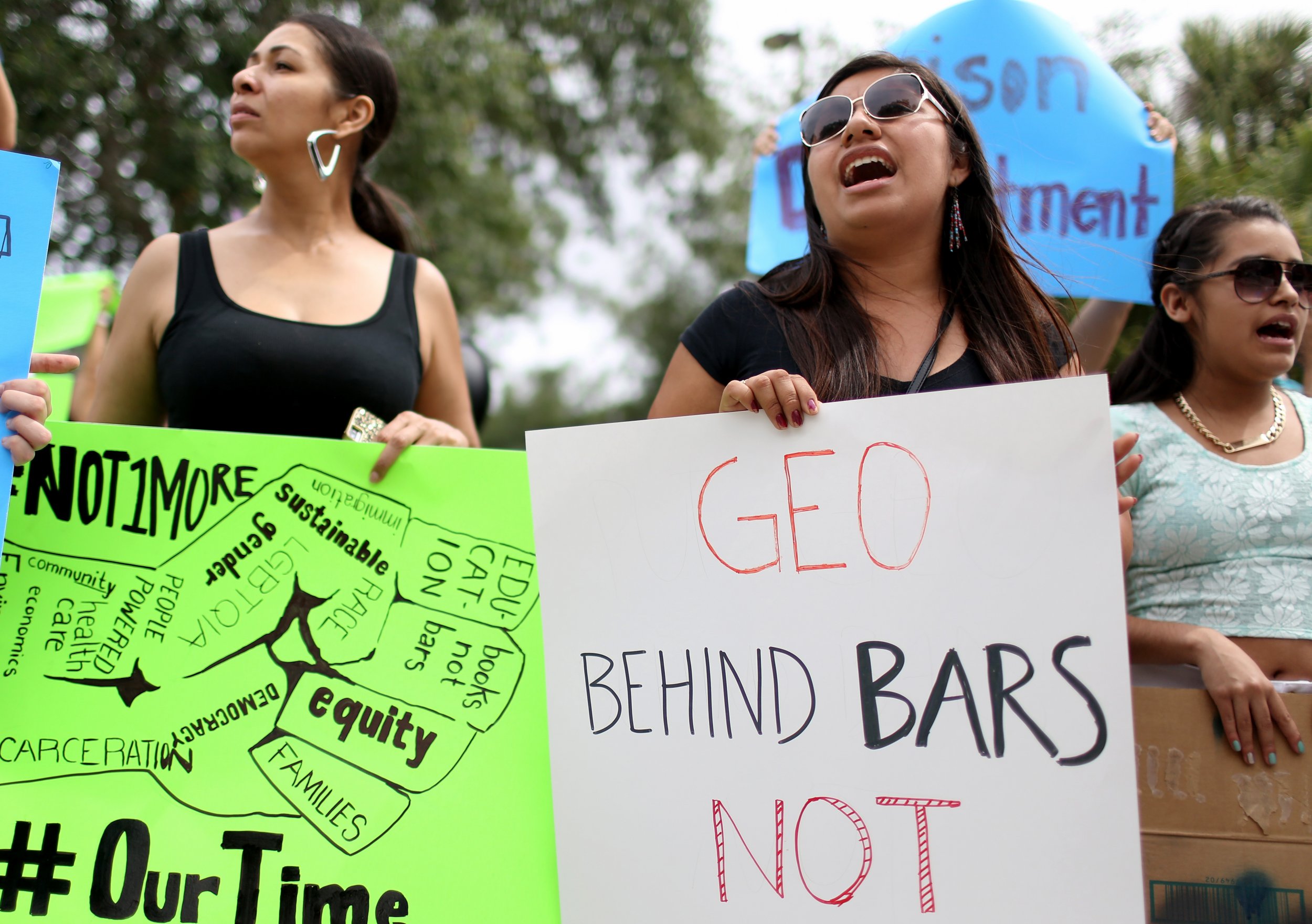
Private prison company GEO Group is warning investors that growing public pressure to divest from the private prison industry "could have a material adverse effect on our business."
In its first-quarter securities filing, the company cited institutional resistance from banks as a material risk to its future operations. In response to pressure from activists, both JP Morgan Chase and Wells Fargo recently announced a moratorium on new financing for private detention facilities. After JP Morgan's announcement, GEO Group's stock took a 16 percent hit.
GEO Group operates or manages 69 detention facilities across the U.S., containing just under 75,000 beds. The company provides detention services at these facilities to numerous federal agencies, including Immigration and Customs Enforcement, the Bureau of Prisons, the U.S. Marshals Service and multiple state and local clients, according to GEO Group's website.
"We will no longer bank the private prison industry," JP Morgan announced in March after a long public pressure campaign from groups like the Center for Popular Democracy. Wells Fargo told industry watchers in its 2018 Business Standards Report: "Our credit exposure to private prison companies has significantly decreased and is expected to continue to decline, and we are not actively marketing to that sector."
Financial institutions have in recent years provided private prisons with a substantial amount of capital. In 2018, GEO Group and CoreCivic, the other major operator in the private prison industry, together raised around $1.8 billion from banks including Wells Fargo and Bank of America, according to Refinitiv.
"The management and operation of correctional, detention and community-based facilities under public-private partnerships has not achieved complete acceptance by either government agencies or the public," the GEO Group filing reads.
GEO Group is not only feeling the heat from creditors and activists but from shareholders as well, as it learned at a recent shareholder meeting. A resolution put forth by the USA West Province of Jesus, a religious group and minor investor in the company, raised concerns about GEO Group's treatment of detainees. The resolution asked shareholders to vote to approve a series of reforms that would require GEO Group to publicly account for how detainees in its custody are treated. The company's board of directors initially recommended against adopting the resolution. (The measure eventually passed after the board of directors changed course, according to a coalition of shareholders.)
In its first-quarter financial results, GEO Group reported net income of $40.7 million, up from $35 million in the first quarter of 2018. Revenues grew year over year as well, with first-quarter 2019 revenues surpassing $610 million versus nearly $565 million in 2018.
"Our financial performance was driven by higher occupancy rates across our diversified real estate portfolio and particularly throughout our federal facilities for ICE and U.S. Marshals Service," CEO George Zoley told investors on a first-quarter earnings call.
Despite the outsize pressure and added scrutiny, GEO Group appears to be expanding its operations. Zoley told investors that the company was awarded "a new 10-year contract with the U.S. Marshals Service" for a detention facility in Queens, New York, as well as a one-year contract extension with ICE for an Aurora, Colorado, processing center.
Senior Vice President Ann Schlarb told investors that the company's ankle monitoring division "has continued to experience steady growth," due in part to ICE's increased use of the monitoring devices. While migrants readily acknowledge that they would rather wear the devices than languish in detention, an investigation from the Texas Tribune found that ankle monitors "can disrupt almost every aspect of daily life, from sleeping and exercising to buying groceries and getting a job."
This article has been updated to reflect the outcome of the GEO Group shareholder vote on the treatment of detainees.
Uncommon Knowledge
Newsweek is committed to challenging conventional wisdom and finding connections in the search for common ground.
Newsweek is committed to challenging conventional wisdom and finding connections in the search for common ground.
About the writer
Asher Stockler is a reporter for Newsweek covering the National Rifle Association and gun policy.
To read how Newsweek uses AI as a newsroom tool, Click here.








